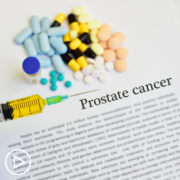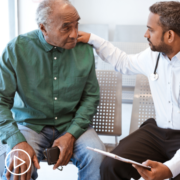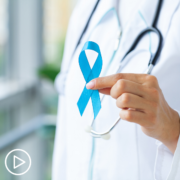Advanced Prostate Cancer: What You Need to Know About Evolving Treatment and Research from Patient Empowerment Network on Vimeo.
Research is evolving quickly, leading to an increase in treatment options for advanced prostate cancer patients. Expert and researcher Dr. Rana McKay reviews current prostate cancer treatment options, discusses where clinical trials fit into a care plan, and shares advice for partnering with your healthcare team.
Dr. Rana McKay is a Medical Oncologist at UC San Diego Health. Learn more about Dr. McKay.
Download Resource Guide
See More from Evolve Prostate Cancer
Related Resources:
Transcript:
Katherine:
Hello and welcome. I’m your host, Katherine Banwell. When advanced prostate cancer patients discussed potential treatment approaches with their healthcare team, it’s important that they understand all of their options including where clinical trials fit in. So, the patient empowerment network created the Evolve Series, to help patients understand the latest research and how it may impact them. In today’s program, we’re joined by a prostate cancer expert who is going to explain and discuss research highlights, and provide tips for having productive conversations about your care. Before we meet our guests, though, let’s review a few important details.
The reminder email you received about this program contains a link to program materials. If you haven’t already, click that link to access a guide to help you follow along during the webinar. At the end of this program, you’ll receive a link to a program survey. Please take a moment to provide feedback about your experience today in order to help us plan future webinars. And finally, before we get into the discussion, please remember that this program is not a substitute for seeking medical advice.
Please refer to your healthcare team about what might be best for you. Well, let’s meet our guest today. Joining us, is Dr. Rana McKay. Dr. McKay, welcome. Would you please introduce yourself?
Dr. McKay:
Absolutely. My name is Rana McKay, I’m a genitourinary medical oncologist, at the University of California in San Diego. It’s a pleasure to be here, with you, on this program today.
Katherine:
And the sun is shining.
Dr. McKay:
Yes.
Katherine:
Which, is always good. Well, thank you so much for taking the time to join us today. Before we get into the discussion, Dr. McKay, I’d like to have you tell us how the landscape of advanced prostate cancer has changed over your career.
Dr. McKay:
Oh, my goodness. It has absolutely rapidly evolved over the last decade. I think when I was just starting my career, it was right around the time where Abiraterone and Enzalutamide were being heavily tested and just getting approved and entering into the clinic. And as we think about all of the evolution that’s happened since that time, we now have multiple androgen receptor pathway inhibitors in the clinic. We have radioligand therapies in the clinic, radium-223. The first radioligand therapy across any solid tumor malignancy to improve overall survival and on the heels of that, most recently, lutetium PSMA, which is a targeted radioligand therapy.
There’s several different kinds of chemotherapies, and I think two more diagnostics have evolved. We are now integrating molecular profiling across multiple areas in the disease natural history and actually have several FDA-approved treatments based off of results of molecular profiling, whether that be germline hereditary testing or just tumor testing like, PARP inhibitors and immunotherapy. And then, additionally, to kind of continue on that same thought of our diagnostics changing is one of the greatest disruptors in our treatment of prostate cancer has been the introduction of PSMA PET imaging that has really revolutionized our ability to be able to detect disease at lower levels of PSA.
And that’s opened up options for focal therapy, radiation therapy, and other sorts of strategies. So, it’s really been just remarkable, all of the different advances that have occurred in prostate cancer over the last decade.
Katherine:
Well, let’s dive into developing research and what it could mean for patients. Are there recent research highlights that you could share with the audience?
Dr. McKay:
Absolutely. I think the newest approvals that have occurred in prostate cancer have been the approvals of combination PARP inhibitors, which block the ability of cancer cells to repair their DNA combined with hormonal agents such as abiraterone (Zytiga) or enzalutamide (Xtandi) for patients who have specific mutations in their tumor and their tumor is no longer responding to treatment. Those are the newest FDA approvals that were recently highlighted and shared.
Katherine:
What areas of research do you specialize in?
Dr. McKay:
The areas of research that I specialize in are particularly around novel therapeutics for patients with advanced prostate cancer, biomarker development precision medicine strategies for patients across the spectrum. And actually, also, in the localized setting, thinking about how we can attempt to cure more patients with prostate cancer by integrating our systemic therapy with surgical and radiation strategies to improve survival outcomes for patients and ultimately, cure it for patients by using effective systemic therapy early on so patients never recur.
Katherine:
Yeah. We’ve been hearing a lot recently about innovations in technology. How are these advances accelerating prostate cancer care?
Dr. McKay:
Innovations of technology have absolutely been revolutionizing prostate cancer care I think from the diagnostic side, there’s new imaging modalities that are getting more refined. On the molecular side, there’s now different kinds of genetic tests. And our ability for us to do these tests, and do them quickly, and get results in real time that we can make decisions on we’ve come a long way from when we first sequenced the human genome. We’re now able to do that so quickly multiple times over in a very streamlined kind of way. And then, I have to say that there’s been tremendous improvement in our modalities of administrating therapies.
So, our therapies are getting more novel, they’re getting more precise. What I mean, by that is targeted radioligand therapy, targeting linking a small molecule that binds PSMA, labeling it with a payload that is radiation therapy or kind of radio therapy/radio particle doing the same thing with chemotherapy, developing antibody drug conjugates. There’s androgen receptor degraders. There’s different ways of administrating immunotherapy by specific antibodies. So, there’s just the different sorts of treatments that are out there.
We’ve just come such a long way from hormone therapy, which is still very important in chemotherapy to other different modes of action with the different systemic treatments we have.
Katherine:
What about individual patients? Is there research into understanding a person’s – just one person’s disease?
Dr. McKay:
Absolutely. I mean, that is in essence, precision medicine. I think we are now molecularly profiling tumors that is standard of care for anybody with advanced disease to undergo hereditary tumor profiling and – or hereditary profiling of just normal cells in the body, if there’s any sort of genetic abnormalities. But also, the tumor itself, and able to do that all for the actual biopsy specimen, or surgical specimen, and also blood. And then, based off of that individual’s genetic makeup, or the genetic makeup of the tumor, or the immune profile of the tumor actually trying to target therapy.
There is a clinical trial that we are eagerly developing through the alliance, which we hope will open to enrollment before the end of the year, called the PREDICT Study. And this study is using that very notion of taking somebody’s DNA and RNA from their specific tumor, and based off of their results, strategizing the treatment around what kind of genetic makeup is in the tumor. And I think we’re moving towards that.
Katherine:
What about common genetic mutations and what are you learning about people who have other genetic mutations like the BRCA mutation?
Dr. McKay:
For patients who have BRCA mutations, first I’ll say, the prevalence of BRCA mutations varies across the stage of prostate cancer that somebody has. In the localized setting, the prevalence is a lot lower on the order of 2 to 4 percent depending on somebody’s risk profile. In the advanced setting, it is higher, 6 to 8 percent. Patients who have BRCA alterations are particularly susceptible to PARP inhibitors, which are oral drugs that can be given that when given in an individual who’s got a BRCA mutation, can cause cell death; can cause a tumor cell to die. And so, that’s a very good thing.
I think the other thing, if thinking about the type of BRCA alterations, if there’s something that’s hereditary, this information is prognostic and predictive in that in can guide how people are going to – how we think they may do and what they may respond to. But it’s also really important because it can inform cascade testing for family members. It could also inform screening for secondary cancers in that individual who has prostate cancer with a known BRCA alteration. So, I think there’s a lot of personalization that happens based off of the molecular profiling results.
Katherine:
It’s all so exciting, Dr. McKay. But progress can only be made with patient participation in clinical trials, as we know. So, when should a patient consider participating in a trial?
Dr. McKay:
Thank you so much for bringing this point up. I think our clinical research is critically important to advancing the field. Clinical trials, I think, are really – they offer our patients the treatments of tomorrow today, quite honestly. And I think the way trials are designed, they’re designed to test different treatment modalities, test in reference to the standard of care. I think at any point in time, anybody can think about enrolling on a clinical trial. I think sometimes there’s this false notion that, “I’m not going to enroll in a trial until later on, until I’ve failed all different kinds of treatments.” That’s not true.
I think at any juncture along the way where a decision is being made around initiating a systemic therapy, or proceeding with a surgical intervention, or radiation intervention it’s always worthwhile to stop and ask, “Are there any clinical trials that I could be eligible for right now? And if so, what are they? So, I think it’s really important, I think, for patients to know that and to ask of their clinicians that are caring for them, “Are there any clinical trials?”
And it may be that patients, not to say, may need to travel, but if they’re not necessarily at that institution where somebody may be receiving their care with a clinician asking their doctor, “Are there other trials at places close by where I can go and explore?” I think that’s a really important thing.
Katherine:
Yeah. That’s good information. What about common misconceptions? What are you hearing from patients about their fears and hesitations about participating in the trial.
Dr. McKay:
Yeah. I think a lot of patients have a fear of, “I don’t want to be a hamster or a guinea pig. I don’t want to get placebo. I don’t want to get suboptimal care.” So, I think, to step back, I think the clinical trials are designed where actually patients are followed very, very closely, probably even more closely than I think would be in general with laboratory tests, PSA testing, imaging, at critical time points to assess that any therapies or strategies is working. Many trials are not necessarily placebo-controlled trials.
Placebo-controlled trials are really only utilized in the context when somebody may – where the standard of care is to either do nothing or do one drug alone, not two drugs, and then, somebody’s getting one drug and getting a placebo. So, the placebo-controlled trials are really, first off, they’re later-staged studies, they’re usually Phase III studies, or large Phase II studies that have gotten pretty far on the runway of clinical trial and clinical drug development.
And it’s in the context of, you know, “Well, if I didn’t do the clinical trials, I’m probably not going to do anything,” or I’m not going to – you know, “If I decided to not do the trial, I would get no treatment, but if I’m doing the trial, there’s a 50 percent chance I’ll get no treatment and 50 percent chance I may get something. So, we have to think about, “Well, what is the standard of care?” and the standard of care matters because that is what it’s being compared to. If the clinical situation is that the standard of care is to monitor, then that’s where a placebo may be utilized.
But if a standard of care is that somebody should get treatment with X drug, then that X drug would be in the controlled arm of the study.
Katherine:
Yeah.
Dr. McKay:
But not every trial has a placebo.
Katherine:
What would you say to someone who is nervous or hesitant about participating in a trial?
Dr. McKay:
Yeah. Very good question, I think. Talk to your clinician. Talk to your doctors about those fears. What are the reservations? What are the concerns? Sometimes, I think the unknown is always – the fear of the unknown kind of causes a lot of angst. But when people are on a clinical trial, when you’re on a clinical trial, you are in control. Some people don’t believe that, but you are, at any point in time, you can decide to stop. You don’t even need to have a reason for why you decide to stop. At any point in time, if something is not working for you, you have choice.
And so, I think that is something that is really important for patients to know that you’re actually in control, you’re being watched very closely, being watched very carefully for safety toxicity. If there’s a toxicity, people are not going to – you’re not going to just stay getting the same regiment in the exact same way if you’re not tolerating it. If something isn’t working, you’re not going to continue receiving the therapy that’s no longer working just because you’re on a clinical trial.
Katherine:
Right.
Dr. McKay:
And you’re in control; at any point in time, you could say, “I don’t want to participate anymore.”
Katherine:
Yeah. Are there barriers for accessing trials? And if so, do you have any recommendations for how to tackle those?
Dr. McKay:
Yeah. I think there are barriers to accessing trials. I think it can be very overwhelming because there’s thousands of clinical trials that are being conducted for people with prostate cancer. And I think as a patient, sometimes it’s hard to navigate that. But I think the thing to take home is that you do not have to do it alone, and you should not do it alone because I think half of the trials that are out there, the large bulk of them may not necessarily be directly applicable to you or relevant for you.
And so, I think talking to your clinician about that, I think seeking care, even if just for a second opinion at an NCI-designated cancer center, or NCI-designated comprehensive cancer center is probably a good idea. You know, if you’re hearing the same message from your local clinician then that’s great. If there’s more options that are being presented to you, that’s great, those are more options that you could tap into. I think talking to patients who have gone on a trial may also help away some of the fear around participating in a clinical trial, and there’s lots of platforms where that could take place either asking your physician, or the American Cancer Society, or other societies can help connect patients to one another.
Katherine:
Okay. I’m glad you mentioned some of the resources because that’s what I was going to ask you about. Well, I want to mention to our audience that if you want more basic information about prostate cancer, PEN has created a prostate cancer toolkit, which includes information about diagnosis and staging. And you can find it at powerfulpatients.org. So, before we move onto understanding current treatment options, Dr. McKay, what are the goals of advanced prostate cancer treatment? And how do they vary by patient?
Dr. McKay:
Yeah. I do think the goals can vary. I think in my mind, a lot of times, it’s making people live longer, making them feel better. Those are the two salient goals and if our therapies are not achieving one or other of those two goals then we need to rethink the strategy. But different people are different, and they may weigh the risks and benefits of any given therapy, or the slated benefit with the slated risk through a different lens. And I think it’s critically important to ensure that you’re having those communications with your doctor about the things that matter to you and the things that are really important to you.
Especially, for people who have advanced prostate cancer. So, I think that can help your clinician strategize, “Okay, is this an individual who wants the kitchen sink everything that I can do even if that means more toxicity that I’m going to offer this thing? Or is this a situation where, you know what, unless there’s data that the kitchen sink is going to work, I really kind of want to temper things and try an approach that’s going to be effective, but maybe not associated with that degree of toxicity.” So, those kinds of conversations absolutely need to be happening.
Katherine:
Yeah. With all the recent advances in treatment, is there a standard approach now to treating someone with advanced disease? And if so, what is it?
Dr. McKay:
Yeah. There absolutely is a standard approach. There’s guidelines that are based off of the FDA-approved regimens of the different agents that can be utilized. There’s data regarding sequencing though, I think there’s more data that needs to be had on sequencing. There are guidelines on when to do germline testing, when to do tumor profiling, when to integrate PSMA PET imaging, the standard hormonal agents, who to use them. So, I do think that there are – there’s a set framework of appropriate management and treatment. But there’s a lot of personalization that is overlaid on top of that rubric. And I think that’s the art of medicine.
Katherine:
Right. Is there testing to understand if a patient’s disease is more aggressive? Or maybe will respond to a certain type of therapy before you begin it?
Dr. McKay:
Yeah. A very good question. And I think predictive biomarkers, as you described them, there are several for men with prostate cancer, but there’s not a ton of them. So, we know that homologous recombination repair alterations, HRR, gene alterations, particularly BRCA 1, 2, probably 2, we know that those are biomarkers of response to PARP inhibitors. We know that patients who have high tumor mutation burden, or have a mismatch repair, that those are markers of response to immunotherapy. We know that if people have a certain level of PSMA PET vividity on their PET scan, that that’s a biomarker for receiving lutetium PSMA.
Those are the main biomarkers that are actually in use in the clinic to date. But I think there’s a lot more that I think are being explored from mutations in the androgen receptor, or amplifications in the androgen receptor, being potentially predictors of response to different degraders, different kind of hormonal agents. There’s certain tumor suppressor gene mutations that may predict that patients may do a little bit better with chemotherapy. So, there’s other markers that are being looked at, but they don’t have the same robustness as the BRCA 1, 2 and other ones that I talked about.
Katherine:
Yeah. How does a patient’s health and lifestyle impact what treatment approach is right for them?
Dr. McKay:
I mean, health and lifestyle, diet, and exercise, nutrition, sleep are so important. I think that one of the backbones of treatment for hormonal therapy is androgen deprivation therapy. There can be negative consequences with regards to muscle mass, bone mass, other things related to that therapy. So, I think it’s critically important for patients to maintain a healthy diet, making sure they’re getting appropriate exercise, weight-bearing, resistance training.
And I think, too, this helps people with their functionality, with their ability, their reserve, and ability to tolerate treatment or tolerate more aggressive treatment. So, half of my clinic is talking about diet and exercise, and how to optimize individual health when people are on therapy.
Katherine:
Yeah. Mentally, a good diet and sleep –
Dr. McKay:
Yes.
Katherine:
And exercise is going to be helpful.
Dr. McKay:
Yes.
Katherine:
As well. What about comorbidities? Do they play a role?
Dr. McKay:
They absolutely do play a role. I think comorbidities like cardiovascular disease, diabetes absolutely can play a role. The hormone therapies, patients can have a propensity to gain weight, they can have a propensity to have worsened cholesterol being on hormone therapy, which can then affect somebody’s cardiovascular health. And so, some of the drugs cause increased hypertension. So, I think understanding the different comorbidities that any individual may have is important in selecting the best therapy, “Well, actually, if you’ve got X, Y, Z going on, maybe I’m going to shy away from this, but lean more towards that.”
I think making sure that your physician knows about that and knows about changes that happen along the way. Sometimes, people with prostate cancer, many a times they have a long, natural history where they’re seeing the physician caring for them for their prostate cancer over many, many years. And somebody’s medical history, when they first saw that individual, it’s going to change and evolve over time as different things happen. And so, I think keeping your clinician that’s caring for you for your prostate cancer informed of all the other non-cancer things that are happening I think is a really good idea.
If you had a fracture, that’s actually a really important thing for somebody who’s got prostate cancer. Or “Gosh, my primary care just started me on Metformin because they think my blood sugar is a little bit off.” These are important things, I think, for clinicians to know about.
Katherine:
Yeah. It’s all about communication, isn’t it?
Dr. McKay:
Absolutely. Yeah.
Katherine:
Don’t worry about over-sharing.
Dr. McKay:
Yeah.
Katherine:
Yeah. Speaking of sharing, shared decision-making has become the gold standard, really, for encouraging a successful relationship between a patient and their healthcare team. What does shared decision mean to you as a provider?
Dr. McKay:
Yeah. I think shared decision is an open dialogue. I think it’s an open dialogue with the physician, with the patient, sometimes, often times, the patient’s caregivers, and families, and loved ones may be involved in that process, where we’re talking about, first off, establishing the goals. Well, what are the goals? And I think, when we start with the goals then, we can say, “Okay. Well, what are the things that we can do to achieve those goals?” And I think sometimes we just dive right into, “Well, what are we going to do with the next step?”
So, I think establishing what the goals of therapy are the things that matter to any individual patient and their family is important. And then, from there, working on, “Okay. Well, aligning with those goals, these are the different things that you can do. These are the pros and cons of the different things that you could do,” and making an informed decision about the next step.
Katherine:
What questions should a patient ask about potential treatment options?
Dr. McKay:
One, what are the different treatment options? You know, sometimes I think that statement doesn’t get said enough. What are the standard of care options? What are the clinical trial options? Ask are there radiation therapies, surgical options? That may be a relevant question for some individuals, some individuals, not. Being very open like, “Okay, I’m hesitant about chemo. Let me explore that.” Well, where does that hesitancy stem from? What’s the fear about chemo? Are there chemotherapy-sparing options right now? Or how can we kind of dispel the fear or myth around chemotherapy?
So, I think these are the questions that I think a patient can ask. How is a therapy administered? Where do I go? How would I receive different therapies are given at different modes of administration? I think those are good questions. Who do I call if something happens to me on the weekend or on a holiday? Who do I reach out to? What are the phone numbers? Give me all the phone numbers. Get them in my phone. Save them in there, so you know, who to reach out to if you ever need something, if you ever need assistance.
Katherine:
Yeah, that’s really good advice. Why should a patient consider finding a prostate cancer specialist?
Dr. McKay:
I think a patient should consider finding a prostate cancer specialist because quite honestly, the field of oncology is getting to be so expansive, and there’s so many changes in guidelines on a monthly basis, sometimes across all the different malignancies. So, I think having a specialist who understands the nuances of the different iterations of treatment for people with prostate cancer, and how to personalize that for a given patient is really important. And I think it can be associated with improved outcome.
I will say that the note about clinical trials, there have been several studies that had been conducted that have actually noted that patients who enroll on a clinical trial, whether or not that clinical trial is positive or not, independent of the results of the trial. But just enrolling on a clinical trial is associated with improved outcome. And I think a lot of it stems with where people get their care, eligibility for trials, the scrutiny that happens when people are on trials, and sort of, level of expertise where people get their care and so forth.
Katherine:
Yeah. Thank you for sharing all of this information, Dr. McKay, it’s really vital. As we close, what final thoughts would you like to leave our audience with? Why are you hopeful?
Dr. McKay:
I am very hopeful because of all of the amazing technologies that are in the pipe right now, currently in development, some early on, some close to the finish line that I think are certainly going to change the way that we view and treat prostate cancer. I think it’s exciting to see where the field has come and where the field is going, and know that you are not in this alone, and there’s a lot of progress that is being made, and a lot of hope that is out there for individuals who have prostate cancer.
Katherine:
Well, Dr. McKay, thank you so much for taking the time to join us today. We really appreciate it.
Dr. McKay:
Wonderful. It’s my pleasure.
Katherine:
And thank you to all of our collaborators.
If you’d like to watch this webinar again, there will be a replay available soon. You’ll receive an email when it’s ready. And don’t forget to take the survey immediately following the webinar. It will help us as we plan future programs. To learn more about prostate cancer and to access tools to help you become a proactive patient, visit powerfulpatients.org. I’m Katherine Banwell. Thanks for being with us.



















